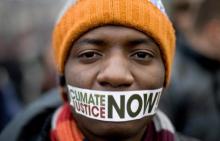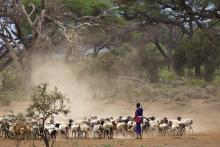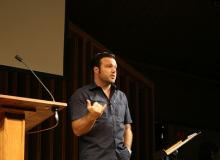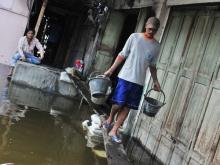Environmental Stewardship
In an attempt to rebuild the image of the five gulf states — Alabama, Florida, Louisiana, Mississippi, and Texas, federal and state officials have joined forces on their journey to replenish the damage from 2010's BP oil-well tragedy. Talks of baseball stadiums, sea walls, and donations to the Gulf Coast Ecosystem Restoration Council are among the many entities who will benefit from President Obama’s Restore Act signed last year. The New York Times reports:
The money will mostly be split among the states and a new entity, the Gulf Coast Ecosystem Restoration Council, composed of state and federal officials. There are already plenty of ideas among the states for spending the cash, including constructing a sea wall around the city jail in Mobile, Ala., and deepening shipping channels. Biloxi, Miss., is using money already given to the state by BP to build a baseball stadium.
Here’s another idea: the states and the council should require that a nickel of every dollar they control be used to buy and protect coastal marshes and wetlands. It is the most important thing they can do to help the gulf survive the next oil spill.
Read more here.
When the ExxonMobil Pegasus pipeline split open in late March it spilled 210,000 gallons of oil into a small Arkansas town. The spill galvanized opponents of the Keystone XL Pipeline, who cited its planned path through major rivers and aquifers. Activists say TransCanada, which would build and operate the pipeline, underestimate the size of potential spills.
"I don't agree with people who say a spill into the aquifer will ruin the whole aquifer. It would ruin a very small piece, but it's important if that's your small piece," John Stansbury, a University of Nebraska professor of environmental and water resources engineering. "But if it got into a major river, it could create a plume hundreds of miles long."
Read more here.
Thomas Tidwell, the chief of the United States Forest Service, told Congress hotter, dried conditions produced by climate change are causing America's longer wildfire season and increasing the amount of land burned. Since 2000, the forest service has almost doubled its spending on fighting fires from $540 million to $1 billion last year. The Guardian reports:
"Hotter, drier, a longer fire season, and lot more homes that we have to deal with," Tidwell told the Guardian following his appearance. "We are going to continue to have large wildfires."
Read more here.

STATISTICALLY, the last couple of weeks of July are the hottest months of the year. In recent decades, the fossil fuel industry has been making them steadily hotter by burning huge amounts of coal, gas, and oil: Last year was by the far the warmest year in American history, and it came complete with biblical-scale fire, drought, and storm.
But this summer it’s the environmental movement that’s going to turn up the heat. Summer Heat is what folks are calling it: a collection of actions taking on the fossil fuel industry in every corner of the country.
Some of the action will stay focused on the route of the Keystone pipeline, but the emerging fossil fuel resistance is much broader than a single project: We’ll be at refineries and power plants and proposed coal ports, and we’ll be making clear that climate change is just part of the spectrum of damage that includes everything from air pollution to political corruption.
These battles have been led on the local level for years now by climate justice groups, by farmers and ranchers, by indigenous activists—by the folks on the frontlines of the damage from fossil fuels. But they deserve backup and reinforcement from the rest of us. And, of course, in an age of global warming, all of us are potentially on the front lines: Until Hurricane Sandy broke over their heads, most people in lower Manhattan thought the world was treating them pretty well.
The Sierra Club, BlueGreen Alliance and Greenpeace have come out in support comprehensive immigration reform measures. The groups believe the 11 million undocumented immigrants in the United States today could be supportive of future green initiatives. Politico reports:
“Right now, there are 11 million people who don’t have the tools, who can’t act without fear. They can’t vote. They can’t engage in the public process. They can’t advocate for clean energy without the threat of deportation,” Michael Brune, Sierra Club's executive director, [said]. “Nobody should live under those circumstances.”
Read more here.

I’ve believed that climate change is the greatest moral issue facing us, and something I want to work on in my congregation. But how? I asked someone who had conducted a survey in our denomination, and he said that most churches discussed the issue but had little or no concrete action. I talked to activist congregations whose members were experiencing burnout and no longer meeting as a group. In a meeting with concerned congregations, I found that they experienced a big separation between climate-change interest groups and social action groups. In my congregation, we formed a “Green Team” that was concerned with saving energy, but it was reluctant to do any political action.
After much prayer and many conversations and group meetings, our Social Justice Minister called a group together that he called “The Climate Change Initiative.” Twenty-five of us showed up, and after we introduced ourselves, our minister said he had noticed three groupings emerging: Practical, Political, and Spiritual Action.
We started to meet in three subgroups, but still collaborated. A year later, I met a leader of a United Church of Christ congregation who had pioneered and formed the UCC national denominational emphasis. She said the same three elements were evident in their congregation work, and that had, she thought, contributed to the pattern for change.

Last week, concentrations of carbon dioxide in the atmosphere reached 400 parts per million – nearly 15 percent over what many scientists estimate is a safe level. Amid this and other crises in creation, the Environmental Protection Agency needs a strong leader to navigate the complex policy and economic situation that governs environmental policy.
In March, In March, President Barack Obama nominated Gina McCarthy to lead the EPA. At the time, many regarded her as a shoo-in, as she has held top posts under Republican governors, was endorsed by many in the energy industry, and has acted as assistant administrator of the EPA under President Obama since 2009.
It was surprising, then, when all eight Republican members of the Senate’s Environment and Public Works Committee decided to boycott McCarthy’s nomination hearing. This surprise decision, which effectively canceled the vote, was part of a longer-term pattern of obstruction and partisanship on once-routine matters.
In the face of such unprecedented risk to human health and well-being, many were surprised that senators tasked with studying issues of clean air, clean water, and similar issues put ideology ahead of fairness in obstructing the vote. Sen. David Vitter, the leader of the obstructionist group, said it best himself in 2005 when discussing judicial appointments: “I think that every nominee deserves a vote. It’s a matter of fairness.”

A massive tornado swept through the town of Moore, Okla., on Monday afternoon, destroying homes and hitting two elementary schools. Emergency crews were rushing to the scenes to rescue staff and students trapped in the debris. One MSNBC report indicated at least 75 children and staff were trapped in one of the schools. From MSNBC:
Two elementary schools were heavily damaged, possibly completely destroyed, KFOR reported. Those schools are Briarwood Elementary in Oklahoma City and Plaza Towers Elementary in Moore.
It was unknown how many children may have been in the schools when the twister hit, but a KFOR reporter saw a student being rescued from Plaza Towers, where the roof was blown off and the cinderblock walls demolished.
Read more HERE.
An overwhelming 97.1 percent of peer-reviewed papers in scientific journals agree that climate change is caused by humans. This finding can be used as a rebuttal against those who believe the scientific community is still debating the causes of climate change. Public opinion is still mixed with only 42 percent agreeing that human activity is the main cause of climate change. The Guardian reports:
"Our findings prove that there is a strong scientific agreement about the cause of climate change, despite public perceptions to the contrary," said John Cook of the University of Queensland, who led the survey.
Read more here.

We in our era have accomplished something no other civilization would have considered possible — or desirable. We have taken human wastefulness and self-destruction to never-before-seen levels and we have distorted our scriptures to justify even celebrate — our own destruction.
Whether it is fracking (with its own legacy of toxic waste) the Keystone XL Pipeline (with its virtually guaranteed oil spills across prime farm land) accompanied by the largest population ever seen on the face of the earth — with its attendant garbage and sewage — we are seeing threats to our climate, food supply, economy, and quality of life on a level never seen before in human history.
Historically, theologies (and philosophy) have put a brake on human avarice, violence, and unbridled destruction of the environment.
Reflection and restraint, for millennia, have been the twin pillars of historic conservatism.
Not now.
The residents of Newtok, Alaska could see their village washed away within five years, making them the first American climate refugees. Newtok is surrounded by the Ninglick River, which continues to carry off 100ft or more of land each year. The highest point in the village could be underwater by 2017. The small community of 350 will be scattered across Alaska, with Newtok ceasing to exist. The Guardian reports:
"The snow comes in a different timing now. The snow disappears way late. That is making the geese come at the wrong time. Now they are starting to lay their eggs when there is still snow and ice and we can't go and pick them," Tom said. "It's changing a lot. It's real, global warming, it's real."
Read more here.
Climate defenders should celebrate the news that Obama is continuing to delay signing a permit that would allow foreign-owned mining company TransCanada a permit to build the northern route of the highly controversial Keystone XL pipeline across the U.S.
After the State Department once again released a highly flawed assessment in March and the Environmental Protection Agency called it “deeply flawed” (again), we see that grassroots pressure is creating an effective roadblock on this incredibly dangerous path.
From Reuters:
The Obama administration is unlikely to make a decision on the Canada-to-Nebraska Keystone XL pipeline until late this year as it painstakingly weighs the project’s impact on the environment and on energy security, a U.S. official and analysts said on Friday.
The decision may not be made until November, December or even early 2014, said a U.S. official … who did not want to be named given the sensitive nature of the project.
Analysts agreed that a decision would not be made by this summer as the State Department had suggested when it issued an environmental review on the pipeline on March 1.
A recent study by biologists and climate researchers finds 57% of plants and 34% of animals will see their habitats cut by 50% or more by 2080. At the current rate worldwide temperatures are expected to rise 7 degrees by 2100. This change will make habitats in sub-Saharan Africa, Central America, Amazonia and Australia unsuitable for animals and plants. USA Today reports:
"The terrifying loss of biodiversity predicted by this study shows that climate chaos will fundamentally transform our planet," Shaye Wolf of the Center for Biological Diversity, a conservation group, says in a statement on the study. "We need to cut emissions now, before our ecosystems suffer catastrophic damage."
Read more here.

We have come to Kenya to hear our brothers and sisters bear witness to the ways environmental degradation and recent changes in the climate are harming them. Their testimony is disturbing and compelling. We are privileged to hear their stories, and honored by their trust in us as bearers of the message that they and their land, water, and air are suffering. Their words are a painful reminder of the brokenness of our world.
It is the most vulnerable in our world who suffer primarily and predominately from climate and other environment-related problems. While here, we are reminded that it is the poor who are affected first of all, and most of all, by these problems. The loss of one season’s crop can be catastrophic for those who live on the margins. Today, we are looking at massive dislocations in the ecosystems which sustain our world and all the life on it. Of these dislocations, the world’s poorest bear the brunt.

One of us was in Seattle this past weekend to speak at a meeting of biblical scholars. The subject:Evangelicals and the Environment. Seattle was stunningly beautiful, with ample sunshine, clear skies, and an occasional happy breeze. Having grown up in nearby Tacoma, seeing majestic Mount Rainier for the first time in a long while brought back memories of this silent guardian from childhood.
Alas, while it was sunny in Seattle, it was theologically cloudy in Dallas, where one of Seattle's famous residents — young, hip pastor, Mark Driscoll — was speaking at a major evangelical conference: Catalyst. By many accounts on Twitter and in the blogosphere (see Nate Pyle's blog), Driscoll said:
"I know who made the environment. He's coming back and he's going to burn it all up. So yes, I drive an SUV."
And after presenting his driving credentials, Rev. Driscoll reportedly added:
"If you drive a mini-van, you're a mini-man."
The U.S. climate change envoy proposed allowing countries to create their emissions reduction plans rather than working toward one goal. The U.S. hopes to bring more countries to the table and energize U.N. climate negotiations. The Guardian reports:
"Countries, knowing that they will be subject to the scrutiny of everybody else, will be urged to put something down they feel they can defend and that they feel is strong," Stern said from Berlin during a summit of environmental ministers focused on ways to advance the UN climate talks.
Read more here.
A study published May 1 from two researchers at the University of Pittsburgh and the University of Colorado found the widespread belief in "end-times" and the "Second coming" of Christ could impact the environmental policy movement negatively. The Huffington Post reports:
A belief in the Second Coming reduces the probability of strongly agreeing that the government should take action by more than 12 percent. In a corresponding manner, a belief in the Second Coming increases the probability of disagreeing with government action to curb global warming by more than 10 percent.
Read more here.

If you are reading this and are from North America — and perhaps even if you aren't — you are no doubt aware of just how divisive the issue of climate change is in the US and Canada. Experts from both sides of the issue are regular installments on the 24-hour news networks, presenting the latest data in favor of or disputing the warming of the planet. Policy experts offer the pros and cons of legislation aimed at cutting greenhouse gas emissions. Law makers debate possible action steps. Facebook posts supporting or refuting climate change turn into hotbeds of political (and sometimes a little bit of personal) attacks. Friends bicker; family relationships are strained.
This is simply the reality of the political climate in North America, but the existence of such rigorous debate is no coincidence. If warming trends continue the way that scientists are currently projecting (four degrees celsius by the end of the century), things in North America won't look all that different. We'll probably experience more droughts, our growing zones will shift, and Michigan will have the climate of Tennessee. Even if things do get bad in North America, we have the money and technology necessary to adapt fairly well to any changes in weather patterns or growing seasons that we might experience. In short: North America can afford not to worry about climate change — at least for a while.
A NASA led study found climate change may increase rainfall in some areas and drought in other areas. The study predicts for every 1 degree Fahrenheit increase in global average temperature, heavy rainfall will increase globally by 3.9%. The Los Angeles Times reports.
"These results in many ways are the worst of all possible worlds," said Peter Gleick, a climatologist and water expert who is president of the Pacific Institute, an Oakland research organization. "Wet areas will get wetter and dry areas will get drier."
Read more here.
